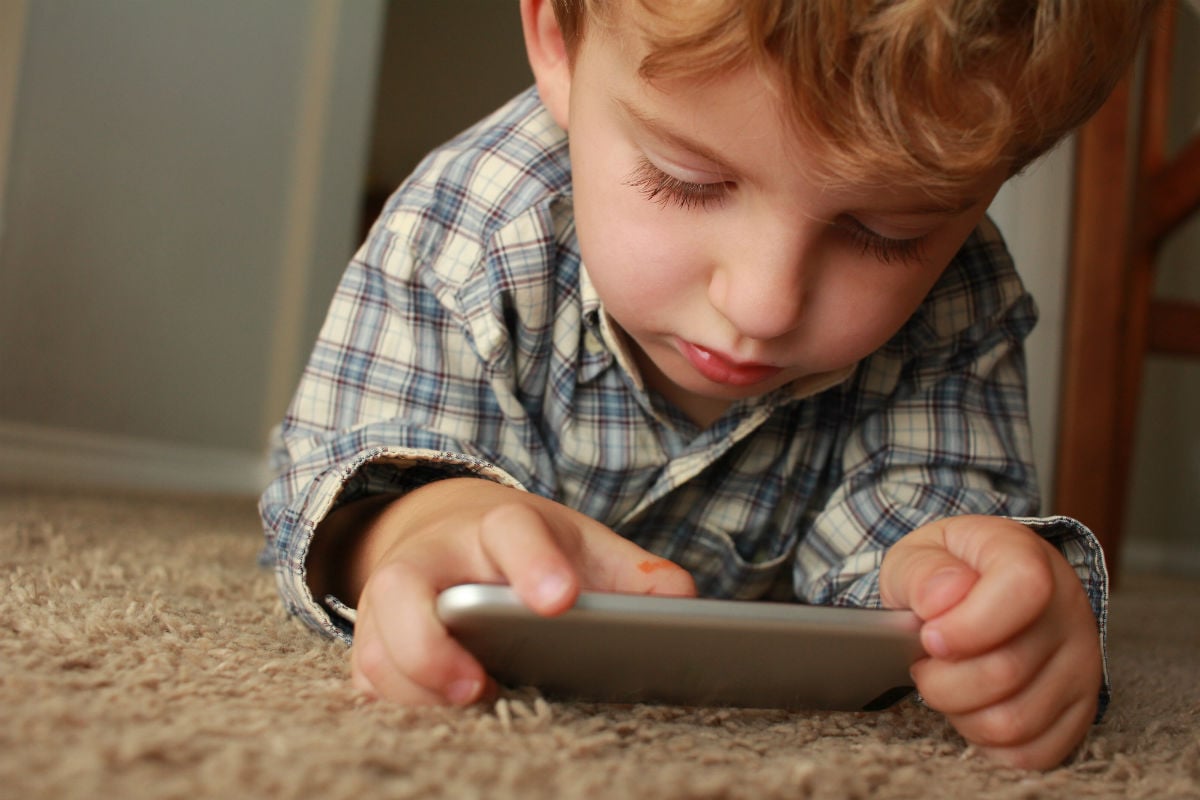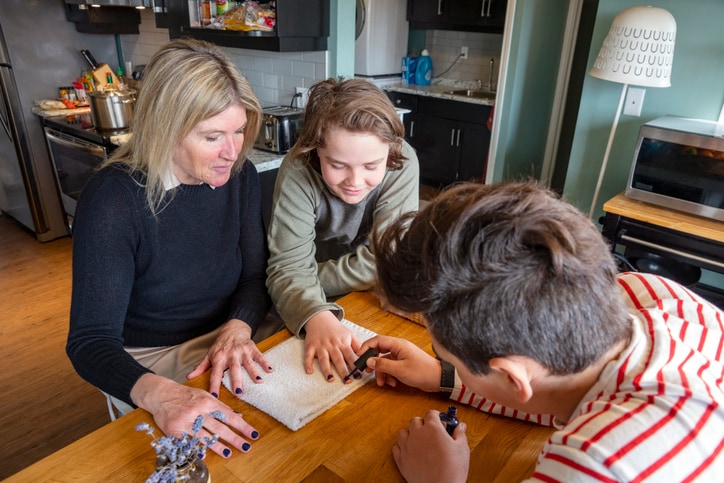More than 1 billion people around the world are on Facebook, and your little one might be next. The social media mega-site recently announced a version of its Messenger app specifically designed for children ages 6 to 12.
If designing a social media app for a group of kids under the age of 13 sounds a bit premature to you, you’re not alone. The announcement left many moms and dads scratching their heads, wondering why Facebook would create an app for children who can’t legally sign up for an account on the site. Since users must be at least 13 years old to create a profile, I started to wonder, “How young is too young?”
As the mom of an almost 5-year-old girl, I can’t imagine myself one year from now saying, “OK, sweetie, time to sign you up for Facebook!” While she has her smarts and wit about her – as much as a little girl can – I’ll be the first to agree that age 6 is quite young for a kid to have their own online account of any sort. But what exactly is Messenger Kids, and how can it be used as a safe introductory learning tool for kids ready to take the leap into their digital lives?
What Is “Messenger Kids”?
Messenger Kids is a standalone app that requires parental involvement. It allows children using an iOS device such as an iPhone or iPad to chat with friends, family, and anyone handpicked by their mom, dad, or caregiver.
Facebook said the app was co-developed with parents, kids, and experts. It “lets kids connect with people they love but also has the level of control parents want,” according to a news release from Facebook.

In order to use the app, a parent with an existing Facebook profile must authenticate their child’s device and set up a profile for their child. It’s not your typical Facebook profile with all the bells and whistles. Setup requires only the child’s name. From there, parents must take control over who their child can communicate with on Messenger Kids. All Messenger contacts must be confirmed by a parent through the main control panel in the main Facebook app using the parent’s Facebook profile.
Within the app, kids can talk one-on-one with others; send stickers, GIFs, emojis, and sound effects; and start group video chats.
Is It Safe?
We spoke to Kristelle Lavallee, a content strategist at the Center on Media and Child Health at Boston Children’s Hospital. She and her team were called in as part of an expert panel to advise Facebook during the app’s development, helping the social media giant understand how children are interacting in the digital space and what concerns parents might have.
A top concern for parents seems to be that Messenger Kids is setting up a child for a regular Facebook profile – likely something many moms and dads aren’t quite ready for.
“This is a completely separate entity from the Facebook parents know, and it needs to comply with the law,” Lavallee, who specializes in child development, says. “But that said, Messenger Kids is an introduction to a broader social media space. Facebook is a dominant force in the social media space, and using Messenger Kids can certainly lead to having a Facebook account when they are older. But from my involvement with the advisory panel, that is not the intention of the app.”
As technology continues to creep into American households, parents of young children may find themselves with no choice but to embrace it. According to a 2017 report by Common Sense Media – a San Francisco-based nonprofit organization that provides education and advocacy to families to promote safe technology and media for children – kids ages 8 and under are spending an average of 48 minutes a day on mobile devices.
The report also found that nearly 98 percent of children ages 8 and under live in a home with some type of mobile device. Inevitably, the majority of children will end up using social media sites like Facebook, as well as the internet.
But even with safety standards in place and an increasing number of young children growing up with smartphones and tablets, parents like Patrick Sallee are hesitant to unleash the World Wide Web upon their kids.
“They aren’t old enough to be discerning about people. No good could come from it,” Sallee, a dad of 7-year-old twin girls, told Care.com about allowing his daughters to use Facebook Messenger Kids. “Right now, I think it is tough to see allowing social media before the age of 16.”
Popular sites like YouTube have recently come under fire for exposing young kids to inappropriate content, hackers stole the information of more than 20,000 children after successfully gaining access to adolescent user accounts through popular children’s smart toy company VTech, and one Illinois dad reported a stranger inappropriately contacted his 7-year-old daughter on Musically, which touts more than 200 million registered users.
How Do I Know My Child Is Ready?
While parents like Sallee may be eager to put an age on when it’s appropriate for their child to be on social media, Lavallee cautions against that methodology and instead wants parents to focus on their child’s individual developmental cues.
“Knowing where they are in terms of how they express themselves, being aware of social norms – like what’s respectful and what’s disrespectful, as well as how the child is able to interpret how their actions are being perceived by others – that empathy barometer. All of those are really good indicators of seeing how that child will interact with others in a digital space,” Lavallee advises. “It’s really up to the parent to understand where their child is developmentally and make that decision with their child, and go from there.”
How to Talk to Kids About Online Safety
But even when children are developmentally ready, it may still be a struggle for parents to give in to the inevitable social media norms. As a mom, I know that my child’s safety is my biggest concern. How can we be sure they’re really safe? After all, it’s not easy being a parent in today’s ever-changing world.
While we can’t 100 percent protect our kids all the time, Lavallee and her team of specialists developed an internet safety toolkit for parents to use as a resource when the time comes, with some of the biggest takeaways being privacy, content and digital citizenship.
“We like to talk about the grandma rule, which is, ‘If you wouldn’t want your grandma to see it, don’t post it online,’” she cautions, stressing the point that privacy is paramount.
She also suggests that parents keep the lines of communication open when it comes to talking about the types of content children come in contact with online.
“If they’ve seen something disturbing, we want to try and remove the shame from that,” she cautions. “Because sometimes, as parents, our reactions can be harmful. It’s really about having an open-door policy when it comes to communication.”
Finally, one of Lavallee’s top online safety recommendations is teaching kids to be kind and smart digital citizens through being mindful of their online actions, just as they would be in person.
So What Comes Next?
Lavallee wants parents to know that Facebook’s overarching goal of Messenger Kids is to connect children with their communities, near and far. From the aunt who lives across the country to the cousin who lives down the road, the app “helps ensure that those lines of communication are open in a safe space with the parent as a key player,” she says.
With the launch of the kids’ messaging app comes uncharted territory for Facebook.
“They’ve made very, very clear to us that this is an ongoing journey and that they will be monitoring this and investing in research [regarding] how children are going to be using the technology and how it affects them,” Lavallee notes. “This is something kids are supposed to be using in tandem with their parents, so hopefully the parental guidance will have a mitigating influence.”
As someone who was born in the late ’80s, I can just barely remember what life was like before computers and cell phones took over. But I did grow up in the era of the internet and have spent a decade on Facebook. When my daughter is developmentally ready, as Lavallee said, I’m all for letting her sign up – as long as I can be an active participant in those early years of her digital life.






